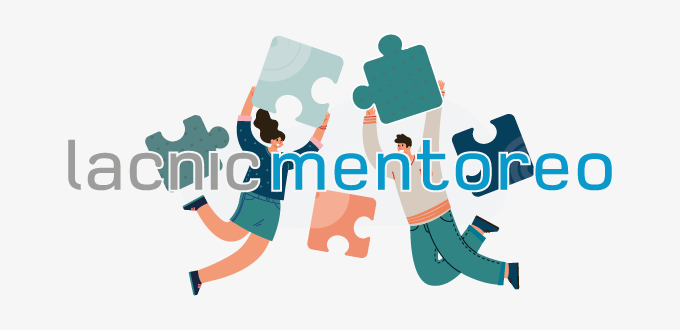IT Women Mentoring Program: “I was fascinated by the unique opportunity to develop myself technically”
22/08/2022

I am an Electronic Engineer, with a master’s degree and a PhD in Telecommunications Engineering, and an MBA in Information Security. Professionally, at the company where I am currently working, I served for more than ten years in the telecommunications networks support and operation departments, where I was one of the persons responsible for the implementation of the MPLS backbone that interconnects all the company’s services. Since 2013, I am part of the ICT network planning team, where I coordinate and work on various projects and initiatives that aim to make the use of digital technologies simple, accessible and agile.
When I saw LACNIC’s call for proposals for the IT Women Mentoring Program, I was fascinated by the unique opportunity to develop myself technically under the guidance of a mentor with recognized experience, sharing the results with the entire community, as well as by the chance to improve myself through technical training and training in soft skills such as time management and effective presentations.
The program totally exceeded my expectations. Not only did I have the chance to interact with specialists during the training courses, but also, from the beginning, I was masterfully guided by my mentor, Rogério Mariano, from whom I received references that helped me further my research and develop the technical work I had proposed, titled “Optimized Distribution of Inter-AS Traffic” and which I had the honor to present at the LACNIC Technical Forum (FTL) during LACNIC 37.
The choice of my research topic was based on a practical difficulty in selecting the best routes for traffic between different autonomous systems, considering more than one, often conflicting criteria, such as cost reduction and the enhancement of user experience. This difficulty originates in the fact that, traditionally, inter-AS routing solutions do not take into account performance parameters, such as circuit congestion and packet loss rates. This is why the development of mechanisms that facilitate the adoption of multi-objective traffic optimization policies is an important topic that has been attracting the attention of those responsible for developing solutions and for network administration.
The first roadblock I came across was defining the method I would approach in such a way as to present practical results that could be replicated in a real scenario. Different alternatives were available and having the experience of a mentor was decisive for the success of the work, because in addition to guiding my searches, he complemented them with very rich information, presenting case studies of solutions adopted by providers and major companies with which he maintains contact.
Based on these guidelines and references, I prepared my paper, where I detailed the use of the Border Gateway Protocol-Egress Peer Engineering (BGP-EPE) technique based on segment routing for the adoption of inter-domain traffic engineering, with a focus on the seamless operation of the services supported by the network and the reduction of operational complexity. In addition to the theoretical contribution, the work also includes practical results, presenting the behavior observed by applying the method in a typical inter-AS interconnection scenario, reproduced in a network simulation tool using images of widely known routers, which will facilitate future work and its adaptation to a real scenario.
(Free access, no subscription required)
Thus, participating in the Program has been an incredible and gratifying experience that has greatly enriched me, whose practical results I am already applying in my professional activities, and which I definitely recommend to other women, not only because of the knowledge sharing or the undeniable personal and professional benefits, but also because the promotion of initiatives such as this decisively contributes to the increase of female participation and leadership within the technical community and the Internet ecosystem.
The 2022 call for the Mentoring Program is currently open. Find all the information here